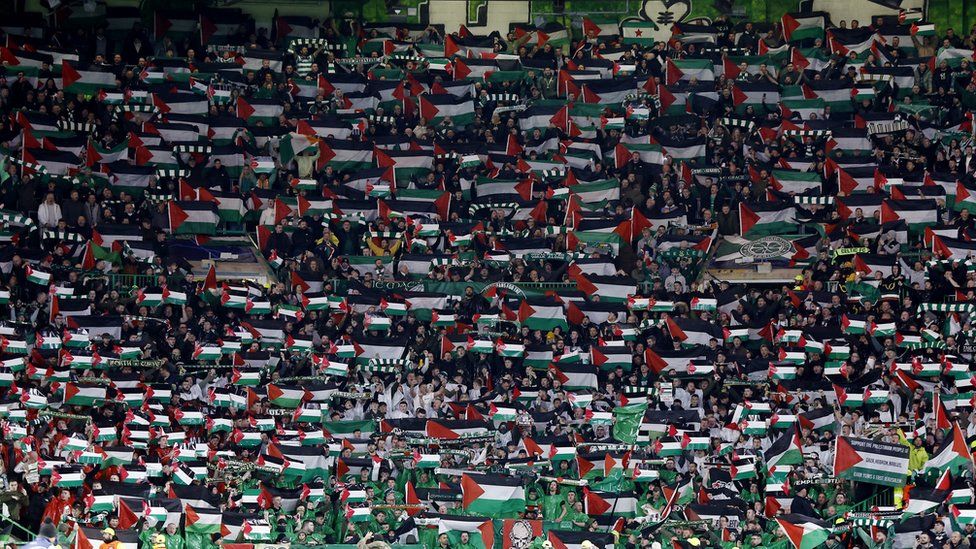1 hour ago
About sharing
A Celtic fans’ group defied a club appeal and held aloft Palestinian flags before Wednesday’s Champions League match.
The Green Brigade previously said they would hand out flags ahead of the game against Spanish side Atletico Madrid.
Celtic have already banned the group from away games after they displayed the flags at recent matches in the wake of the attacks in Israel and Gaza.
It is expected the Scottish champions will now receive a fine from Uefa.
The Green Brigade, which occupy the north curve of Celtic Park, traditionally organise a tifo – a choreographed display involving a large banner or image – for major games.
But as the teams emerged from the tunnel for the Group E match they instead held up the Palestinian flags.
In a message to supporters before the match, Celtic said players and coaching staff from both sides would wear black armbands “as a show of respect and support for all those affected by the conflict”.
But the club said banners, flags and symbols relating to the Israel-Hamas war “should not be displayed at Celtic Park at this time”.
Celtic fans have displayed Palestinian flags at recent Scottish Premiership games against Kilmarnock – hours after Hamas launched a deadly attack on Israel – and Hearts.
The Green Brigade previously reiterated its “unshakeable belief” that football supporters have the right to express political beliefs.
A statement released by the group said the sanctions they had faced were “motivated by a desire to quash political expression within the Celtic support”.
The statement continued: “In spite of this, and any further obstruction, we once again encourage fans to courageously fly the flag for Palestine.”
The group said they would distribute “thousands” of flags outside Celtic Park ahead of the game despite being prohibited from bringing them into the stadium.
Israeli winger Liel Abada, who is currently injured, is being supported by the club as the conflict escalates.
In its message to fans, Celtic said the club “hope and pray for peace, and for humanitarian support to reach those who are in need and in fear”.
It added that it “recognises that our supporters hold personal views to which everyone is entitled”.
“As a club open to all, we all belong at Celtic Park. Celtic Park is where we come to support our football club,” the statement said.
“Recognising this, respecting the gravity of the tragedy unfolding and its impact on communities in Scotland and across the world, and in line with other clubs, leagues and associations, we ask that banners, flags and symbols relating to the conflict and those countries involved in it are not displayed at Celtic Park at this time.”
To many football supporters, their clubs are an extension of their beliefs.
Some fans are happy to follow the football alone, but others want to be associated with an entity where their views on other matters can be shared in solidarity, in the stands, supporters’ buses or in social clubs.
It has been this way since working men first aligned themselves with the colours of their local village, town, or city’s football club. But the globalisation of football, along with the globalisation of the media, has made that concept ever more difficult and sometimes extremely delicate.
Celtic Football Club has always prided itself on being open to all but as an organisation founded in the late 19th Century to help feed the poor, its core ethos has, understandably, been viewed as one aimed towards social justice and equality.
So how do fans, keen to share and promote those beliefs, express them in a world where politics and world events are so polarised and football authorities want nothing to do with any of it?
This is the backdrop to the ongoing dispute between the club and a section of its support who are determined to show support for Palestine. Celtic have already been fined on two separate occasions after some fans displayed Palestinian flags during Champions League matches.
The club has recently distanced itself from banners displayed by a section of its support, following the attacks by Hamas in Israel and both Uefa and Fifa are adamant that politics and football should never mix. In a game where money is king, sponsors don’t want the controversy.
Those who want to use the club to convey their message are adamant they won’t be silenced, though.
As ever, caught in the middle are those who want to leave the world behind for 90 minutes and concentrate solely on the football.
Many Celtic fans have long had an affiliation with the Palestinian cause, with supporters displaying the territories’ national flag on a number of occasions.
In 2014, European football’s governing body Uefa fined the club after fans waved Palestinian flags during a match against Iceland’s KR Reykjavik.
Perhaps most controversially, the Green Brigade chose to display the flag once again during their team’s 2016 Champions League qualifier against Israeli side, Hapoel Beer-Sheva – a move which landed the club a £8,600 fine.
Celtic were also fined more than £15,350 by Uefa after fans displayed an offensive anti-monarchy banner during a Champions League match last year.
Uefa said the fine was for showing a “provocative message of an offensive nature”.
Celtic aren’t the only Scottish football club to be punished for fan rule-breaking.
In 2022, Rangers were fined £4,400 by Uefa for actions by supporters during their Europa League group-stage ties.
Hearts were also fined for £10,500 for fans’ offences after objects were thrown onto the pitch during their 2022 Europa Conference League match against Italian side Fiorentina.
Related Topics
7 hours ago
5 days ago
11 October 2022
19 November 2021
